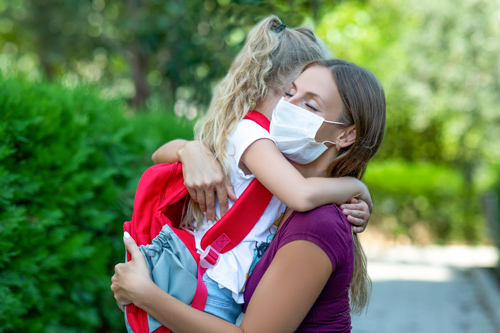
Recently, my older son tested positive for COVID-19. For 18 months, we had feared COVID-19 and did everything in our power to avoid it — mask-wearing, social distancing, the whole nine yards. Thankfully, he had been vaccinated and recovered quickly. But we still needed to quarantine. One evening, after a long day of isolation, there was a soft knock on the door. I got there just in time to glimpse my son's friend jump into her father's SUV before pulling away. A plastic container, filled with homemade chocolate chip cookies, sat on our front porch with a note. The note wished us good health and said that we were missed. The gesture was simple but made us feel not so alone. The cookies weren't bad either.
By now, many families have received that dreaded note from school or daycare explaining that somebody has COVID-19. Unfortunately, it is inevitable. But beyond following the school's and our physician's advice about isolating and testing, what else can we do?
Talk About It
When a friend tests positive for COVID-19, our own children are bound to have questions and may feel vulnerable. They may have heard about people becoming very ill from the coronavirus and be triggered to worry. This is a great time to talk with them about COVID-19 and reassure them. There are plenty of good resources out there for this conversation.
Quarantine: It's a New Jewish Value
Often, when somebody tests COVID-19 positive, all their close contacts need to quarantine. Judaism is all about community, but, in this time, isolating ourselves can be our most Jewish action. Quarantine can be scary, irritating, or boring, especially for children. Children may miss out on activities and feel disappointed. Remind your child about the importance of pikuah nefesh, preserving good health. By staying home, they are keeping themselves and others healthy. What's more Jewish than that?
Related: Is Social Distancing a Jewish Value?
“Visiting” Somebody in Quarantine
Bikur cholim, visiting the sick, is an important Jewish value that becomes more challenging in these COVID-19 times. How do we “visit the sick” when their diagnosis requires isolation? There's plenty that we can do.
Involving our children in bikur cholim makes them feel less vulnerable and helpless when a friend is ill. Here's just a few ideas.
-
Make a card, small gift, or meal.
-
Share a good book with your friend. Then, set up a time to discuss it.
-
Stay in touch with phone calls, Zoom meet-ups, and emails. You can even plan an online playdate or game night.
-
Offer to help them keep up in class by delivering homework.
Avoiding Lashon Hara, Gossip
Typically, when a classmate tests positive for COVID-19, the note from school doesn't identify who is ill. Curiosity is a natural human tendency. Out of curiosity, children will wonder who is sick and want to help. Parents will too! But Judaism warns us against lashon hara, gossip. It is important to trust that the school is sharing information on a “need to know” basis. Often, families will share the news of their positive test. Consider this an invitation to reach out and check in. But, when the news isn't public, consider it an opportunity for a conversation about privacy and gossip. And an opportunity for commending your child for their compassion!
May your family know good health. And may “dreaded” notes from your school be very few and far between!
Bio
Deborah Bodin Cohen is rabbi of Beth Chai in Bethesda, Maryland. Recipient of a National Jewish Book Award, she is author of nine children's books, including PJ Library selections Nachshon Who Was Afraid to Swim and the Engineer Ari series. Debbie and her husband David have three children and a rather unruly Collie.
February 22, 2022